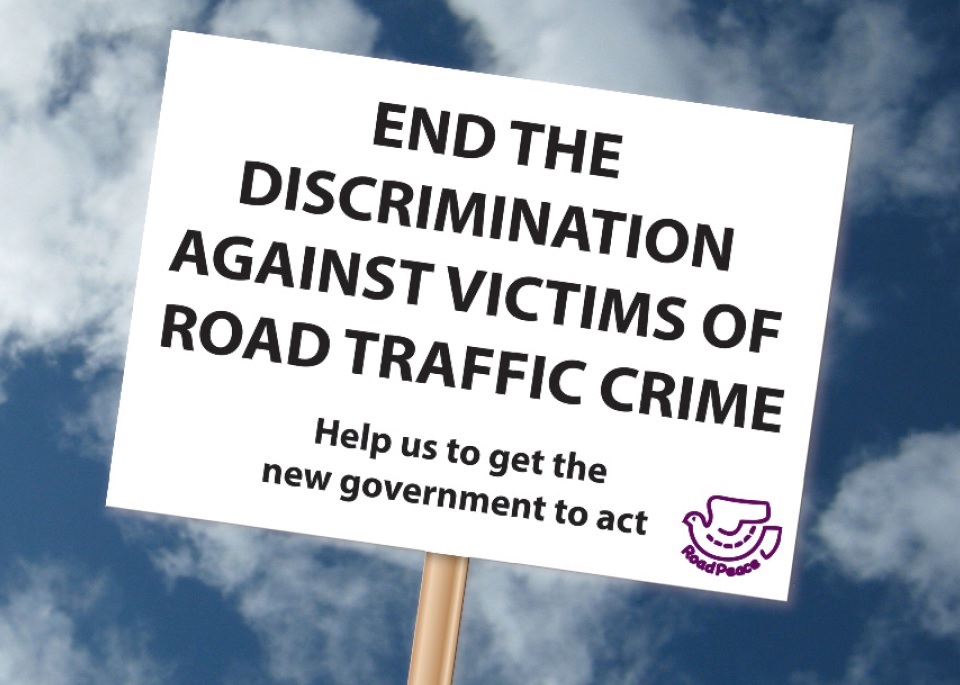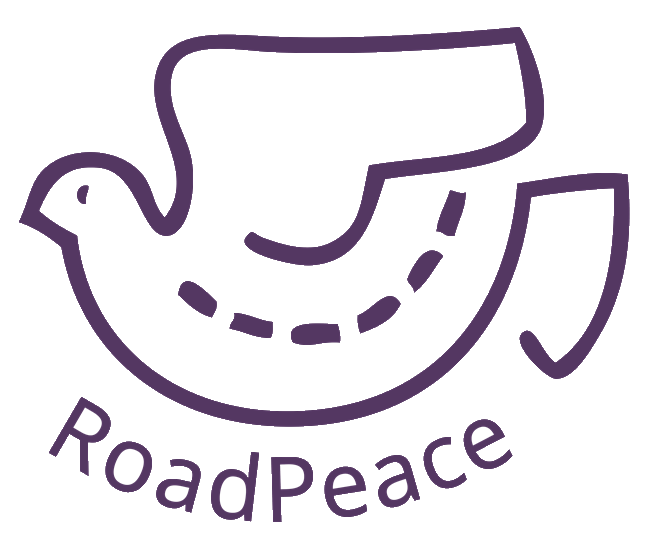Ending the discrimination against road crash victims has been a longstanding call for RoadPeace. And for good reason. Victims of road traffic crime are not treated as victims of crime. They go unsupported and even uncounted. Until this happens, we cannot imagine proper resources and priority being allocated to collision investigation and criminal prosecution of offending drivers. Justice and safety requires fair treatment of victims.
Change is coming.
Our justice system is taking two steps forward. One big and one not as big as it should have been. The MOJ has launched a consultation on the Code of Practice for Victims (Victims’ Code) which would (finally) recognise victims of summary motoring offences as victims of crime. This is a really big step.
The second and smaller step involves the victims’ right to review when the police decide “No Further Action” (NFA). As many readers will know from the twin tragedy of Michael Mason’s death and the lack of prosecution of the driver involved, this is a key issue. Since April, victims of National Crime Recorded Standard (NCRS) offences have the right to ask for a review of the charging decision if the police decide NFA or to drop all charges. . This change came in quietly with neither the Home Office nor The National Police Chief Council (ACPO’s replacement) issuing a press release about it. Labour had proposed both these steps in their Victims’ Task Force report published two months earlier. Thanks again to our members for responding to Labour’s consultation on this—it made a difference.
But the right to review police charging decisions applies only to NCRS offences. So this will help bereaved families and those alleging dangerous driving but it does not apply to those injured in all other cases, including where careless driving or drink driving were suspected.
So some progress but not as much as there should have been if the NCRS, like the definition of victim, was to be extended to include summary motoring offences, at least those involving injury.
What difference will including victims of summary motoring offences make?
Victims of crime qualify for entitlements under the MOJ’s Victims’ Code. They have to be kept informed of the investigation. Track my Crime should be extended to Track my Crash, as was requested by RoadPeace when it was launched in Avon and Somerset in 2011. It has now been extended nationwide but still does not apply to road crashes.
Victims of crime are notified of the outcome of the investigation. This will require the police to monitor the outcomes of collision investigations, another long standing call of RoadPeace.
It’s 2015. Shouldn’t we be able to know how many pedestrians were killed by dangerous drivers? Or children injured by drink drivers? Or motorcyclists killed by unlicensed drivers. This information is not known because the data is not being collated.
And victims should be offered support, or at least information on support services. For the first time, Police and Crime Commissioners will be required to provide support to road crash victims. Given that DfT has been allocating tens of millions of pounds from motoring fines for the past few years, lack of funding should not be an issue.
Long time coming
The government has rejected previous requests by RoadPeace and others to treat victims of summary motoring offences as victims of crime. RoadPeace campaigned on this issue in 2005 when the first Victims’ Code was drafted.
And when the MOJ last consulted on the Victims’ Code two years ago, British Cycling, CTC, and LCC supported RoadPeace’s response to the MOJ which called for parity for victims of road traffic crime. But we didn’t convince the MOJ. The revised Code, launched at the end of 2013, maintained the narrow and mean-spirited definition of victim.
But we kept trying. Ending the discrimination against road crash victims was our sole demand in our 2015 parliamentary manifesto.
Thanks to our members who contacted their MPs to ask for their support in ensuring justice for road crash victims.

Why now?
In addition to efforts by our members, we have the EU to thank for this progress. The EU Victims’ Directive https://ec.europa.eu/justice/criminal/victims/index_en.htm comes into implementation on 16 November 2015, which, appropriately, is the same day as this year’s commemoration of the World Day of Remembrance for Road Traffic Victims https://worlddayofremembrance.org/ .
In the consultation on the Victims’ Code, the Ministry of Justice is proposing to adopt the EU Victims’ Directive’s definition of a victim:
- A person who has suffered harm, including physical, mental or emotional harm or economic loss which was directly caused by a criminal offence;
- A close relative of a person whose death was directly caused by a criminal offence.
They had previously told RoadPeace that this would not happen, hence our parliamentary manifesto https://www.roadpeace.org/resources/RoadPeace_manifesto_2015_3.pdf.
What more is needed?
Whilst this is an important step towards ending discrimination, much more is needed. We need to ensure that
- All crash victims presumed victims of crime until contrary is proven.
- Victims of road traffic crime are counted and included in criminal justice statistics and strategies.
- The government extends its definition of homicide definition to include culpable road deaths (as the CPS already does, but not the Home Office or MOJ).
And whilst we have focused here on the treatment of victims, we will cover other key areas in our justice campaign, including collision investigation and criminal prosecution, in future blogs.
How you can help
Please respond to the MOJ consultation on the Victims’ Code. Thank them for starting to close the gap in how road crash victims are treated, compared to other victims, including those of minor offences such as pickpocketing. And urge them to extend the right to review police charging decisions to at least those crashes involving serious injury.
The consultation deadline is 16 August 2015. It is a short consultation and you do not have to answer all questions. Contact RoadPeace if you would like more information or a copy of our response.
Dedication
This blog post is dedicated to three women. Jodie Webb, who would have been 36 today had her life, and that of her friend Joanne Greenwood, not been stolen by a dangerous drink driver on Jodie’s 21st birthday on 6 August 2000. Her mother June, who will never recover from the death of her daughter, was able to consider other people, existing and potential victims as well as offenders. She established the RoadPeace memorial garden in Beswick, Manchester where young offenders came to learn about the potential devastation of their actions and help tend the garden. For many years, June held a remembrance ceremony on this day. This blog is dedicated to Jodie Joanne and June. Our world needs more lives like June’s and an end to deaths like Jodie and Joanne’s.
Updated on: 6 August 2015
